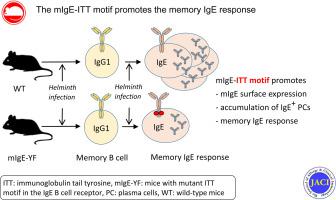Journal of Allergy and Clinical Immunology ( IF 11.4 ) Pub Date : 2020-02-28 , DOI: 10.1016/j.jaci.2020.02.015 Michaela E R Schmitt 1 , Johannes Lutz 2 , Paul Haase 1 , Michael R Bösl 3 , Jürgen Wienands 2 , Niklas Engels 2 , David Voehringer 1

|
Background
Allergic inflammation is driven by IgE-producing plasma cells (PCs), which are required for IgE-mediated activation of mast cells and basophils. Repeated antigen encounter elicits a memory IgE response with elevated serum IgE titers and accumulation of IgE-producing PCs. However, the cellular compartment and molecular signals that underlie the immunologic memory of IgE responses remain unclear.
Objective
With this study we aimed at clarifying whether inactivation of the cytoplasmic immunoglobulin tail tyrosine (ITT) motif in transmembrane IgE (mIgE) impairs the memory IgE response in mice.
Methods
We generated mice with an inactivated mIgE-ITT motif and analyzed serum IgE levels as well as the generation of IgE-producing germinal center B cells and PCs subsequent to primary and secondary infection with helminths. In vitro cultures were used to study the mIgE-ITT–controlled expression of mIgE on the surface of PCs. Systemic mast cell activation was determined by serum Mcpt1 ELISA in response to ovalbumin challenge.
Results
mIgE-ITT–mutant mice showed an impaired memory IgE response subsequent to helminth infection. Furthermore, sensitization and challenge of mIgE-ITT–mutant mice with ovalbumin resulted in diminished serum IgE titers and reduced mast cell activation. The mIgE-ITT motif was required for optimal cell surface expression of mIgE B-cell antigen receptors but not for intracellular IgE expression in PCs.
Conclusion
These results indicate that the mIgE B-cell antigen receptor plays a critical role in establishing or maintaining the population of IgE-producing PCs during memory IgE responses.
中文翻译:

IgE转换的浆细胞的B细胞抗原受体调节记忆IgE反应。
背景
过敏性炎症由产生IgE的浆细胞(PC)驱动,这是IgE介导的肥大细胞和嗜碱性粒细胞活化所必需的。重复遇到抗原会引起记忆IgE反应,血清IgE滴度升高,并且产生IgE的PC积累。但是,尚不清楚IgE反应的免疫记忆基础的细胞区室和分子信号。
目的
通过这项研究,我们旨在阐明跨膜IgE(mIgE)中胞质免疫球蛋白尾酪氨酸(ITT)基序的失活是否会损害小鼠的记忆IgE反应。
方法
我们生成了具有灭活的mIgE-ITT基序的小鼠,并分析了血清IgE水平以及在原发性和继发性蠕虫感染后产生IgE的生发中心B细胞和PC的产生。体外培养用于研究mIgE-ITT在PC表面控制mIgE的表达。通过响应卵清蛋白激发的血清Mcpt1 ELISA确定全身肥大细胞的活化。
结果
蠕虫感染后,mIgE-ITT突变小鼠表现出记忆力IgE反应受损。此外,用卵清蛋白敏化和攻击mIgE-ITT突变小鼠会导致血清IgE滴度降低,肥大细胞活化降低。mIgE B细胞抗原受体的最佳细胞表面表达需要mIgE-ITT基序,而PC中细胞内IgE表达则不需要。
结论
这些结果表明,在记忆IgE反应期间,mIgE B细胞抗原受体在建立或维持产生IgE的PC群体中起关键作用。











































 京公网安备 11010802027423号
京公网安备 11010802027423号